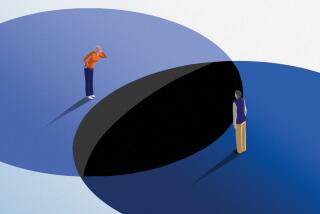Scholars Debate Role Einstein’s First Wife Played in His Work : History: Researchers say Mileva Maric was a brilliant physicist who went unrecognized because of the sex discrimination of her time.
- Share via
NEW ORLEANS — Albert Einstein sometimes helped his first wife do the household chores: “He felt sorry that after her housework was done, she had to do his mathematical problems till way past midnight,” says Senta Troemel-Ploetz, a linguist and historian.
But was Mileva Maric merely Einstein’s housekeeper and algebraic assistant, or was she a physicist in her own right, who would have been recognized as a co-author in her husband’s work were it not for the pervasive sexual discrimination of the time?
A trio of researchers recently presented papers, shouted their responses, and at times nearly came to blows arguing over Maric’s role in the work of the young Einstein, during the annual meeting of the American Assn. for the Advancement of Science.
“Certain aspects of his life have been largely neglected by male biographers,” said Troemel-Ploetz, who is working in the United States with a research grant from the West German government.
For example, she says, in the 1979 biography, “Albert Einstein: The Human Side--New Glimpses From His Archives,” “there is not a single letter written to either his first wife or his children, not even a single letter or text in which their names are mentioned.”
Maric and Einstein met at the Swiss Federal Institute of Technology in 1896. They took almost the same courses, wrote their final theses in the same area and took their final exams in spring, 1900.
Both received failing grades, but Einstein was allowed to graduate.
The two were often separated before their marriage three years later, as Einstein traveled seeking employment. The second volume of the collection of Einstein’s life works and letters was published this year; more than 30 volumes are expected.
In the 41 letters from Einstein to Maric that have been published, there are frequent references to “our research” and “our work.”
In one letter, Einstein wrote: “For the work on the Thomson effect I took refuge to still another method which has a certain similarity with yours . . . and which also presupposes your investigation. If only we could start tomorrow!”
Einstein eventually secured a job as an examiner in the Swiss Patent Office in 1902, and the couple married in early 1903.
In 1905, while they were visiting Maric’s father, she is reported to have told him “a short while ago we finished a very important work which will make my husband world famous,” Troemel-Ploetz said.
That year, Einstein published his papers on special relativity, Brownian motion (which led to the proof that matter is composed of molecules) and the photoelectric effect, for which he was awarded the 1921 Nobel Prize.
Einstein left Maric in 1914.
She often had to take in boarders to buy food for herself and the couple’s two children. But he gave her the entire proceeds from the Nobel Prize, which she spent paying for the care of their psychotic son. She died in poverty.
A book on her life, “In the Shadow of Albert Einstein: The Tragic Life of Mileva Einstein-Maric,” originally written in Serbo-Croatian, is now in its fourth German printing.
Although Einstein’s biographers have described Maric as an academically unexceptional “Serbian peasant girl,” her parents would have had to be wealthy to have paid for her study in Switzerland, said Troemel-Ploetz.
“She couldn’t have entered the physics class of an elite boys school as the only girl with special permission if she had not been brilliant,” she said.
Maric worked with physicist Paul Habicht to develop a machine for measuring small electric currents.
“It took a long time, not only because she had so much to do, but also because of her thoroughness and perfectionism,” Troemel-Ploetz reported, quoting Maric’s biography.
But when Einstein patented the device, her name was omitted and the patent was listed under the name “Einstein-Habicht.”
“It was quite normal for men to appropriate women’s work and take credit for it then,” said Troemel-Ploetz. An alternative explanation, she said, is that there was an agreement between the couple to keep the wife’s contributions secret so that her husband would have a better chance of obtaining a university appointment.
When Maric was asked why her name was not on the patent, she replied, “What for? We are both only one stone,” Troemel-Ploetz said. ( Einstein means “one stone.”)
Finding out what role Maric played in the formulation of Einstein’s most famous theories may be impossible, since only 10 of her letters have survived.
“Sources about women disappear,” Troemel-Ploetz said. “It doesn’t mean that they were intentionally destroyed. It is just negligence.”
“True, only 10 of her letters to him are preserved, compared to 41 of his to her, but you could not pick 10 of his so devoid of discussions of physics,” argued John Stachel, a professor at Boston University, who edited the first two volumes of Einstein’s papers. “The fact remains that you can’t get away from physics in his letters, while there is none in hers.”
Shouting his words, Stachel stated there is “not a shred of evidence known to me indicating that Maric worked on (special relativity). I cannot assert categorically that she did not; I merely ask that we weigh the probabilities in the light of all the available evidence.”
But an analysis of Einstein’s letters by Evan Harris Walker, a physicist and cancer researcher in Maryland, shows that Einstein often acknowledged points of physics and theory that Maric had raised in letters that are now lost.
Walker also presented evidence at the symposium that a noted Russian physicist named Abraham F. Joffe had seen the original manuscripts of Einstein’s 1905 papers while Joffe was a graduate student, and that one of the authors named on the papers was “Einstein-Marity,” the Hungarianized spelling of Maric’s name. The original manuscripts no longer exist.
Abraham Pais, a physicist at Rockefeller University in New York who has written a major biography of Einstein, said in a telephone interview: “I have heard such stories before. From all my readings and my detailed studies and knowledge, I believe that Mileva was a great help to Einstein in (only) a technical sense.
“You know, they were fellow students. She tried to pass the exam and failed both times,” said Pais, who knew Einstein but never spoke with him about his first wife.
Maric’s failing grade means nothing, argued Troemel-Ploetz, who said that it wasn’t until 1982 that the Swiss federal court ruled that universities must have the same academic standards for men and women.
Troemel-Ploetz knows of these practices firsthand, she said, because she was once a professor in Switzerland.
“I often saw women who were better than men get poorer grades,” she said. “I could not defend them to my colleagues because I was only one voice.”






